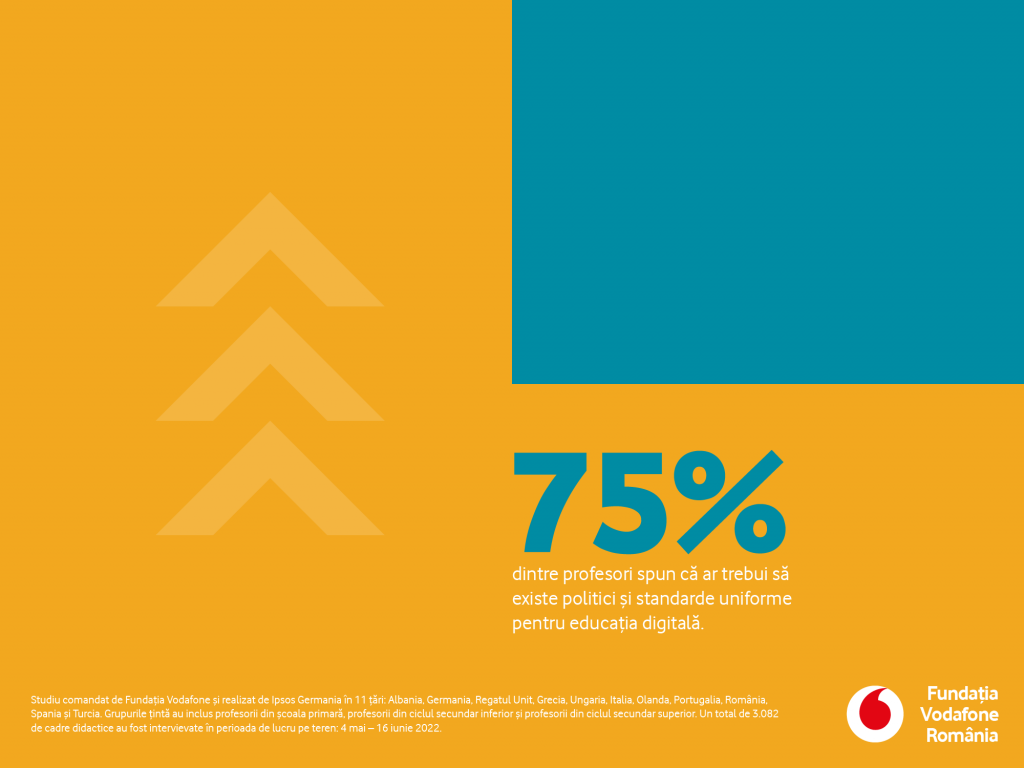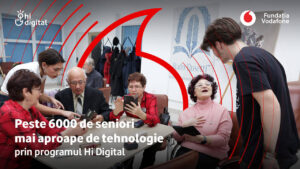- Vodafone Foundation study reveals digital divide in education across Europe
- Only 27% of teachers in Romania have repeatedly participated in official digital training courses. The European average is 39%.
- Vodafone Foundation’s mission through SkillsUpload Europe aims to drive lasting systemic change in how people learn to use technologies in their personal, professional and academic lives. The program is focusing on primary and secondary school pupils, adults not in education, employment or training and older people.
Bucharest – October 11th, 2022 – Only 27% of teachers in Romania have participated in certified courses for the digital training needed for teaching, according to the latest international study by the Vodafone Foundation. Romanian teachers rely more on the knowledge of their colleagues than on training courses when it comes to using technology in the classroom. Large gaps in digital education exist across Europe, the data also shows.
The Vodafone Foundation announces the launch of the 21st Century Teachers Report, which includes information on the digital divide situation among teachers in several countries, including Romania. The study, published on World Teachers’ Day, reveals a significant digital divide in education across the continent, with teachers advocating the need for training opportunities and support from policymakers to meet government expectations and provide students with quality digital education. The 21st Century Teachers Report shows how social and technological demands are transforming education in Europe and identifies areas where teachers need support.
The survey of 3,000 teachers from 11 European countries reveals that teachers are not sufficiently prepared for the new technology-led world and that they need support to provide students with quality digital education.
Romanian teachers are among the least trained in the use of technology and digital lessons, according to the report. Only 27% of Romanian teachers have participated in training courses, while the European average is 39%. A quarter of the teachers describe themselves as digital novices, meaning they can use technology, but only for basic and well-defined tasks.
Major differences at European level
The study shows that leaders and experts in digital teaching are more prevalent in the Southern European countries of Greece, Portugal, Spain, and Italy, as well as in Hungary, then they are in other countries. Less digitally skilled teachers are found in Romania, Turkey, Germany, Albania, and the Netherlands.
- 20% of teachers surveyed say they have little or no experience using digital technology for teaching.
- 48% feel increased work stress due to the lack of integration of digital technology in their teaching,
- 42% feel they quickly reach their limits when using technology.
- By contrast 48% of teachers report they use a variety of digital technology with their students
Demands for a uniform European standard
- 78% of teachers believe more is expected of schools and teachers from their government in digital teaching than can actually be achieved.
- 72% think education policy measures are not sufficient to prepare students for future job markets,
- 75% of teachers state there should be uniform European wide policies and standards for digital education.
Joakim Reiter, Chief External and Corporate Affairs Officer, Vodafone Group, said: “While it’s alarming to see so many teachers across Europe struggling to keep up with the race to accelerate digital education, I’m encouraged by their readiness to support education reform at a European-wide level. With 2023 earmarked as the European year of Skills, if we want to see the next generation of youth empowered and thriving in an increasingly complex, ever more digital 21st century world, it’s critical that we take a serious look at the support, training and tools needed to set schools and teachers up for success.”
The 21st Century Teachers report, reveals impressive ratings from teachers for Romania’s IT infrastructure. Except for IT support, our country is a leader in all areas.
In response to teachers’ needs, Vodafone Foundation’s mission through SkillsUpload Europe is to empower everyone with the skills, confidence and know-how to thrive in a flourishing digital society. The program operates in 14 European countries, focusing on primary and secondary school pupils, adults not in education, employment or training and older people. Through locally targeted, tailored learning initiatives as well as partnerships with communities, educators, NGOs and governments, SkillsUpload Europe aims to drive lasting systemic change in how people learn to use technologies in their personal, professional and academic lives.
Methodology
The survey was conducted by Ipsos Germany in 11 countries: Albania, Germany, United Kingdom, Greece, Hungary, Italy, the Netherlands, Portugal, Romania, Spain, and Turkey. Target groups included primary school teachers, lower secondary teachers, and upper secondary teachers. A total of 3,082 teachers were interviewed during the field work period of May 4 to June 16, 2022.





Vodafone Romania Foundation is a Romanian non-governmental organization and registered charity distinct and independent from the company’s commercial operations, established in 1998. In its more than 20 years of activity, Vodafone Romania Foundation has financed 1,168 programs run by 745 NGOs from around the country. The projects have had more than 3 million beneficiaries: children, young people, elderly, physically, socially or economically disadvantaged people. So far, Vodafone Romania Foundation has invested over 31 million euros in projects implemented by partner non-profit organizations. More details about the Foundation’s programs can be found at www.fundatia-vodafone.ro, http://jurnaldebine.fundatia-vodafone.ro/ and https://facebook.com/fundatiavodafone.




